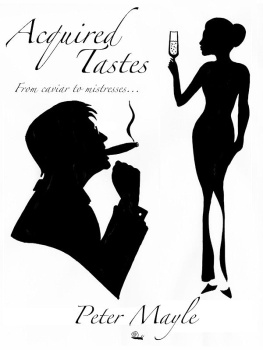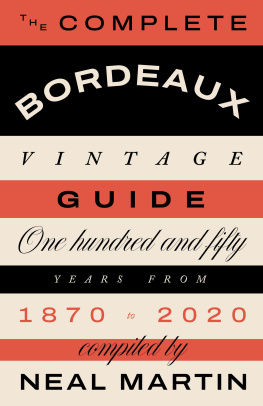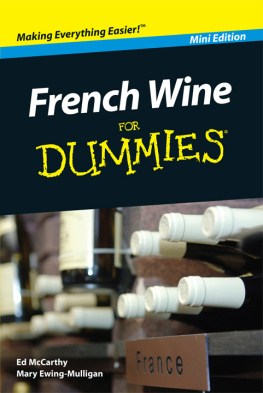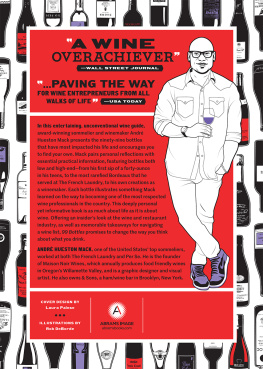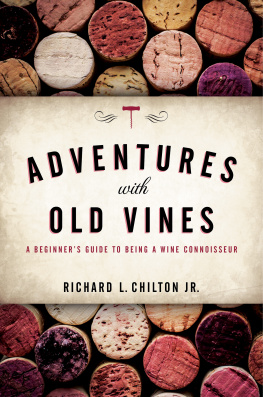
Peter Mayle
The Vintage Caper
For Jon Segal,
avec un grand merci

Danny Roth took a final dab of moisturizer and massaged it into his already gleaming cranium, while checking to make sure that his scalp was innocent of any trace of stubble. Some time ago, when skin had first begun to take over from hair, he had toyed with the possibilities of a ponytail, often the first refuge of the balding man. But his wife Michelle had been less than enthusiastic. Just remember, Danny, she had said, underneath every ponytail is a horses ass. That had persuaded him to embrace the billiard-ball look, and he had since been gratified to find himself in the company of several stars, their bodyguards, and assorted hangers-on.
Peering into the mirror, he studied the lobe of his left ear. He was still of two minds about an earring: a dollar sign in gold, perhaps, or a platinum sharks tooth. Either would be appropriate for his profession, but were they rugged enough? Tough decision. It would have to wait.
Stepping away from the mirror, he padded into his dressing room to choose his outfit for the day, something that would take him through a morning of client meetings, lunch at the Ivy, and a private screening in the evening. Something conservative (he was, after all, a lawyer) but with a devil-may-care touch of informality-he was, after all, an entertainment lawyer.
A few minutes later, dressed in a dark-gray suit of superfine worsted, a white open-neck silk shirt, Gucci loafers, and socks of buttercup yellow, he picked up his BlackBerry from the bedside table, blew an air kiss in the general direction of his sleeping wife, and went downstairs to the granite and stainless steel splendors of the kitchen. A pot of fresh coffee and Variety, The Hollywood Reporter, and the L.A. Times, provided by the maid, had been placed on the kitchen counter. The early-morning sun was up, promising another glorious day. The world was as it should be for a member of Hollywood s professional elite.
Roth could hardly complain at the hand life had dealt him. He had a young, blond, fashionably gaunt wife; a thriving business; a pied- -terre in New York; a ski lodge in Aspen; and-the house that he considered his headquarters-a three-story steel-and-glass pile in the gated, high-security community of Hollywood Heights. It was here that he kept his treasures.
Like many of his contemporaries, he had accumulated a selection of socially impressive accessories. There were diamonds and closets full of status clothing for his wife; three Warhols and a Basquiat for his living room walls; a strolling Giacometti for his terrace; and a perfectly restored gullwing Mercedes for his garage. But his favorite indulgence-and, in a sense, the cause of some frustration-was his wine collection.
It had taken many years and a great deal of money to put together what was, so Roth had been told by none other than Jean-Luc, his wine consultant, one of the best private cellars in town. Perhaps the best. There were the top-level Californian reds and a wide selection of the most distinguished white Burgundies. There were even three entire cases of the magnificent 75 Yquem. But the crown jewels of the collection-and the source, understandably, of great pride-were the five hundred or so bottles of premier cru claret from Bordeaux. Not only were they first-growth; they were also from the great vintages. The 53 Lafite Rothschild, the 61 Latour, the 83 Margaux, the 82 Figeac, the 70 Ptrus-these were stored in a cellar beneath the house and kept permanently at 56 to 58 degrees Fahrenheit, with an 80 percent humidity level. Roth added to them from time to time, when the odd case came on the market, but he seldom took any of these great bottles upstairs to drink. Just possessing them was enough. Or it had been, until quite recently.
Over the past few weeks, Roths enjoyment as he contemplated the contents of his cellar had been less keen than usual. The problem was that, apart from a very few privileged souls, nobody ever saw the bottles of Latour and Margaux and Ptrus, and those who did often were not sufficiently impressed. Only last night, a visiting couple from Malibu had been given the grand tour of the cellar-three million dollars worth of wine!-and they hadnt even bothered to remove their sunglasses. Worse still, they had then declined the Opus One served with dinner and demanded iced tea. No appreciation, no respect. It was the kind of evening that could make a serious wine collector weep.
Shaking his head at the memory, Roth paused on his way to the garage to admire the view: west to Beverly Hills, east to Thai Town and Little Armenia, south across the endless shimmering sprawl to the toy-sized planes that came and went from LAX. Perhaps not the prettiest of views, particularly when the smog was up; but it was a high view, a long view, an expensive view, and, best of all, his view. Mine, all mine, he sometimes thought to himself, especially at night when the lights below made a shining carpet that stretched for miles.
He squirmed his way into the snug confines of his Mercedes and inhaled the perfume of well-nourished leather and polished walnut. This particular model was one of the great classic cars, so old that it predated the invention of the beverage container, and Rafael, the Mexican caretaker, looked after it as though it were a museum piece. Roth eased it out of the garage and headed for his office on Wilshire Boulevard, his mind going back to his wine cellar and that dumb couple from Malibu, whom hed never liked anyway.
From thinking about them, it was only a short mental hop to a more philosophical consideration of the joys of possession. And here, Roth had to admit that the appreciation-even the envy-of others was crucial to his own enjoyment. Where, he asked himself, is the satisfaction of having desirable possessions that others hardly ever see? Why, it would be like keeping his youthful, blond wife locked away from public view, or sentencing the Mercedes to a lifetime of confinement in the garage. And yet, here he was, keeping millions of dollars worth of the worlds finest wines in a cellar that was unlikely to see more than half a dozen visitors a year.
By the time he reached the tinted-glass box that contained his office, Roth had come to two conclusions: first, that inconspicuous consumption was for wimps; and second, that his wine collection deserved a wider audience.
He stepped out of the elevator and walked toward his corner office, bracing himself for the daily mano a mano with his executive secretary, Cecilia Volp. Strictly speaking, she was not quite up to the job. Her spelling was lamentable, her memory frequently patchy, and her attitude toward many of Roths clients one of patrician disdain. But there were consolations: she had the most spectacular legs, long and permanently tanned, made even longer by a seemingly inexhaustible supply of four-inch heels. And she was the only daughter of Myron Volp, the current head of the Volp dynasty that had pounced upon the movie business two generations ago and that still maintained considerable influence behind the scenes. As Cecilia had been heard to say, the Volps were the closest it got in Hollywood to a royal family.
And so Roth tolerated her for her connections, despite her lengthy personal calls, her frequent makeup breaks, and that atrocious spelling. As for Cecilia, for whom work was something to do between dates, her duties were largely decorative and ceremonial. Roths office provided a socially acceptable base, undemanding tasks (she had her own personal assistant who dealt with all the tiresome but essential details), and the occasional buzz from meeting the famous and the notorious who made up Roths list of clients.
Next page


